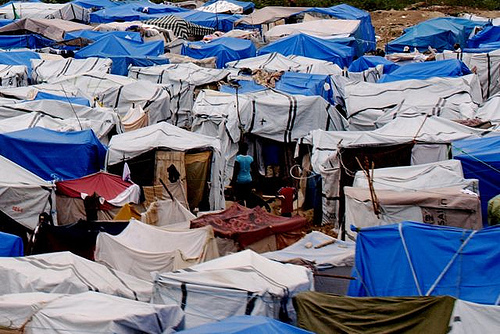
This post originally appeared on the World Bank's Conflict blog on January 19, 2011.
The first anniversary of Haiti's earthquake has seen a lot of finger pointing. The country's Prime Minister, Jean-Max Bellerive, faults the donors for failing to open the tap on promised funds. Others blame his government and the legions of NGOs and aid workers for not getting their act together.
As the recriminations reverberate, the bottom line is that ordinary Haitians -- with 800,000 of them still living in temporary shelters -- don't see much improvement in their lives. Many, it is reported, feel abandoned by both their government and the international community.
The Prime Minister recognizes things need to move faster and blames the donors who, he says, insist on funding things like education, infrastructure and transport. If the government had its way, the focus would be on clearing the rubble that still dominates the cityscape in the capital Port au Prince and other parts of the country, he says.
What to do to seize the initiative in a country which has known only trauma and deceptions for the past many decades?
There's no right answer but actions that build confidence would be a big first step. This finding from research for the 2011 WDR -- which looks at violence, security and development -- certainly resonates in Haiti.
Swift action on projects that show things are changing for the better can have a major impact in building the confidence that is central to the shift from extreme fragility to the kind of resilience that eventually translates into the security, justice and jobs that citizens want and need.
When I was in Bulgaria in the early 2000s, a social activist told me things were finally getting better in the capital, Sofia. I asked her how she gauged progress. Her answer was simple: that morning she had seen garbage trucks doing their rounds in her neighborhood for the first time in months.
Picking up trash and other tangible actions are concrete indicators of a government's determination to offer people some kind of normality and hope. They also demonstrate the authority's ability to deliver on people's expectations.
Where should governments focus their attention? Is it a question, as Mr. Bellerive suggests, of making rubble clearance sexier, so that donors will fund it ahead of education?
Selling project ideas to donors is only part of the story. The starting point is to listen to the public; to find out what they want and expect. Only then does it make sense to start setting priorities for what can be delivered, drawing on non-government capacity if necessary, and being sure to communicate results to the population.
Once you get the virtuous cycle in motion, how many such tangible results are enough? Our consultations highlight the need for governments to demonstrate at least two to three visible wins in the first year following the kind of transition point that the earthquake could mean for Haiti.
There is no agreed check-list or pre-approved sequence for such interventions. Getting it right requires an astute assessment of what it is possible to deliver plus an ability to make difficult trade-offs.
Whatever action is taken, whether it is rubble clearance or education, results need to be repeated at regular intervals to maintain momentum and build the confidence that is the elixir of progress in places that have been to hell and are not yet back.
